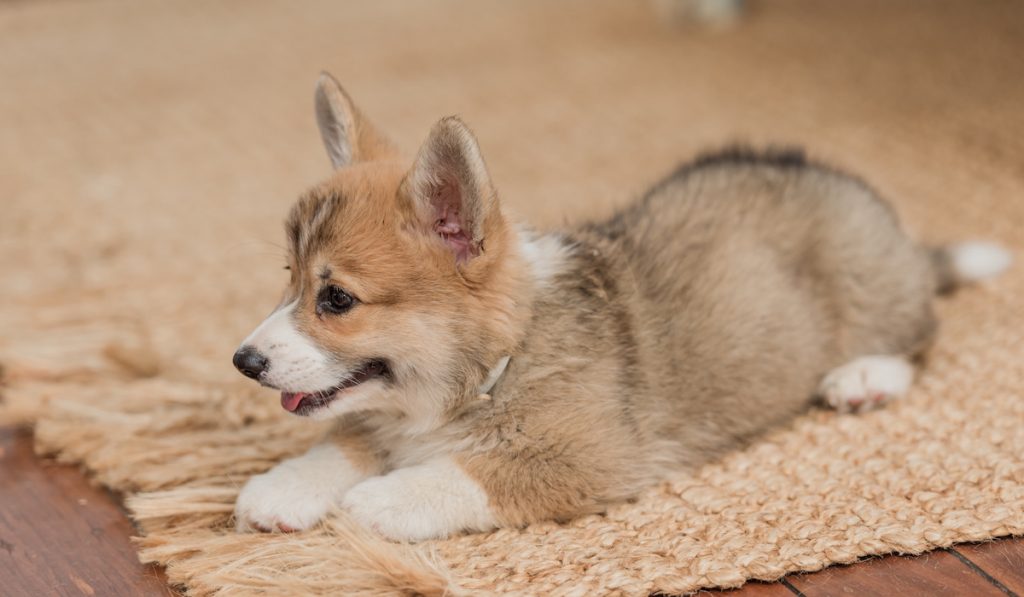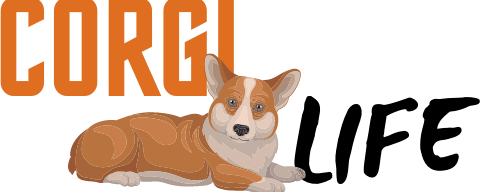Without a doubt, corgis can be cute and cuddly. Their flatulence, on the other hand, can be off-putting. Now, you might be asking yourself, do corgis fart a lot? Well, let us find out.
Do corgis fart a lot?
Ordinarily, corgis do not fart a lot. They pass gas as much as they should, and they are generally not gassier than any other dog breed.
However, under certain conditions, an individual corgi may fart excessively. In some cases, those conditions might be a health issue.
You might be asking yourself, what conditions make corgis fart a lot? Well, we have the answer in this article. We also talk about some of the reasons corgis smell and much more.

Do Corgis Fart a Lot?
Under normal conditions, corgis fart as much as they should. In other words, corgis will typically not fart a lot, only as much as necessary. You could also say their usual rate of passing gas is not more than that of other dog breeds.
But can corgis fart a lot? Corgis can fart excessively, and sometimes, this may be normal. However, if their excessive farting extends over a couple of days, then you should be wary. Corgis fart excessively for various reasons, and some of them are potentially harmful.
Why Does My Corgi Fart a Lot?
Corgis may be farting excessively for any of the following reasons:
Lactose Intolerance
In a few cases, dogs can tolerate minimal quantities of dairy products. However, in most cases, dogs, including corgis, are lactose intolerant.
If you give your corgi significant amounts of dairy products, you should not be surprised if it starts farting too much. Since the digestive system of dogs is not suited for effective digestion of lactose – one of the natural sugars in dairy products. Bacteria act on lactose instead.
While fermenting lactose, the bacteria generate a lot of gas, which leads to farting, bloating, and other symptoms.
In general, lactose intolerance may be harmless to dogs, but it is a very uncomfortable condition. Apart from that, the foul smell from a farting corgi is hard to ignore. So, you should avoid giving your corgi milk, cheese, yogurts, and other similar dairy products.
While lactose is the primary cause of lactose intolerance in corgis, some other food items may also have the same effect.

Food Additives
Besides lactose, many food additives may trigger digestive issues in corgis. Obviously, when they spark such digestive problems, they can cause your corgi to fart a lot.
Some manufacturers tend to add high amounts of carb fillers to their dog food. Carb fillers are known to cause digestive problems, so when your dog eats this kind of food, it may fart a lot.
Besides carb fillers, the following are some food additives that can cause corgis to fart too much:
- Carrageenan – this is a binding agent commonly found in low-quality wet canned food. Carrageenan possibly causes IBD (inflammatory bowel disease) – a gastrointestinal condition. So, it is not surprising that it can cause your corgi to fart too much.
- Cellulose – this typically causes gas only in significant amounts.
- Corn Syrup
- Xylitol
If you notice your corgi is farting too much because of dog food containing any of the ingredients above, stop giving it this food. If your corgi keeps consuming the ingredient it reacts to, it may end up suffering from an acute health issue.
Eating Rapidly
While some dog breeds are known to be fast eaters, most dogs eat pretty fast. The rapid rate at which dogs gobble up their meals is one of the leading causes of flatulence.
While eating their meals too quickly, dogs take in a lot of air (aerophagia). The thing with dogs swallowing air with their food is that they have to release the swallowed air. And how do they let the air out? They fart.
To keep your corgi from eating rapidly, you can do the following:
- Try placing a clean tennis ball amidst its meal. Whenever it reaches the ball while eating, it will slow down.
- You can control your corgi’s eating speed by putting its meals in interactive bowls.
- Try getting rid of its feeding bowl and spread its meal across the floor instead. With its meal spread all over the floor, your corgi will spend more time foraging to feed.
- Offer small meal portions throughout the day. With your corgi’s meal spread in bits throughout the day, it is less likely to starve at any point. Thus, it will not have to rush its food whenever it gets fed. If you intend to spread your corgi’s meal this way, speak with the vet to ensure you are not overfeeding it.
- Your corgi may become exhausted and hungry after intense exercise. Of course, if it is hungry, it is pretty likely to rush its food when it gets fed. So, to avoid this, do not put your corgi through intense exercise before or after a meal.

Gastrointestinal Issues
If your corgi has a gastrointestinal disease, it will most likely fart a lot.
Below are some diseases that cause corgis to fart a lot:
- Inflammatory bowel disease (IBD)
- Irritable bowel syndrome (IBS)
- Pancreatitis
- Intestinal parasites
- Cancer
- Colitis
Because of the possibility of health issues like those above, you must take your corgi to the vet if it starts farting way more than usual.
If your corgi is farting a lot because of a disease, and the disease remains undiagnosed, things may go very sour. But with early detection, most of the ailments can be treated or managed. This is why you should quickly take your dog to the vet when you notice that things might be out of place.
Low Activity
Inactivity or low activity can cause corgis to become overweight, and when corgis are corpulent, they fart more.
According to the American Kennel Club (AKC), a mature corgi should weigh around 22-30 pounds. If your corgi weighs more than this, the excess weight may be causing it to fart a lot.
In this case, you can reduce the amount of gas your corgi pass by getting it to lose weight. Besides lessening how much your corgi farts, losing weight can help your corgi become healthier.
A daily 1-hour exercise routine is a great way to get your corgi to lose weight.

Eating Table Scraps
Table scraps are not always okay for corgis. If you or your kids are offering table scraps to the corgi, you may be contributing to its flatulence.
There are some differences in the digestive system of humans and dogs. For this reason, dogs cannot eat some of the food items we eat without fuss.
You might think, “oh, this is a vegetable; it shouldn’t disturb the dog.” But this is not always the case; vegetables like broccoli, brussels sprouts, peas, and cauliflower will make your corgi fart more. Besides, if your corgi gets a bite from your spicy meal, it is highly likely to become flatulent.
So, if you have been offering your dog table scraps, you may want to stop.
In some cases, you might not be the one offering table scraps to the dog. The dog may be getting in the trash and eating food items. Even worse is the fact that the dog might be eating rotten food in the garbage.
If you notice that your corgi gets in the trash, you should make the can inaccessible to it.
Diet Changes
If you only just added something new to your corgi’s diet, or if you totally change its diet, the changes may be causing the excess gas production.
In this case, the corgi may be unable to tolerate the new diet or food item. Then again, the diet changes may have been done too quickly.
If the corgi cannot tolerate the new diet, you should stop it and speak with a vet. However, if you rushed the changes, you should try taking a slower approach.
Make the transition to the new diet over 9-10 days. Introduce 10-15% of the new diet every day while taking 10-15% of the old diet until you reach 100% of the new diet.
If, after giving it some time, your corgi still farts a lot, see a vet. There may be some other underlying problem that only a professional can detect.

Why Do Corgis Smell?
Ordinarily, corgis are clean dogs, thanks to their double coat. However, in the following situations, your corgis may become smelly:
- As you may have guessed, excessive farting can make your corgi smelly.
- If you are not bathing the corgi well enough.
- If your corgi is very active and is not groomed accordingly, it will become smelly.
- If your environment is dirty, your corgi may become smelly as it picks up dirt on its coat.
- If you wash your corgi with low-quality shampoo, you may never really wash all the dirt away. Consequently, the dog will smell when it shouldn’t.
- Corgis may become smelly if they have a yeast infection.
- When exposed to allergy (seasonal or food allergy), the skin of a corgi gets inflamed and secretes an oily substance. This substance can make corgis smell. Poor diet may also trigger the same reaction.
- Dental infections can cause corgis to have bad breath. And when this happens, the corgis may become smelly.
- Ear infections may also cause corgis to become smelly since the odor they produce is typically intense.
- Your corgi may also become smelly if its bedding is left untidy. Remember, the bedding will collect dirt anytime the dog lies on it. So, if it stays unkempt for too long, the filth will accumulate and start to smell. Of course, since your corgi lays in the bedding, it will become smelly too.
Do Worms in Dogs Cause Gas?
Worms in dogs will cause gas when they are excessive. Besides causing gas, these worms can affect the growth of a puppy and cause other digestive problems.
Final Thoughts
Farting is normal in corgis, but excessive farting is not.
More times than not, corgis fart a lot when they eat a food item they cannot tolerate. But sometimes, their flatulence may be a sign of a disease.
So, if you notice that your corgi has been passing gas more than usual, pay attention and take action. Be ready to visit a vet as soon as possible.
Resources
- https://corgicare.com/do-corgis-fart-a-lot
- https://pawsandlearn.com/why-does-my-corgi-fart-so-much
- https://emedicine.medscape.com/article
- https://vcahospitals.com/know-your-pet/internal-parasites-in-dogs
- https://corgiadoption.com/corgi-odor
- https://neeness.com/why-does-my-corgi-smell-so-bad/#Why_does_my_dog_have_a_strong_odor
- https://corgiguru.com/grooming/do-corgis-smell-bad
